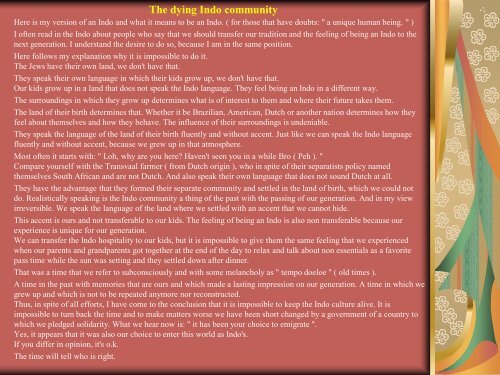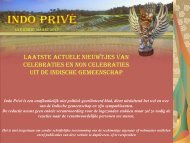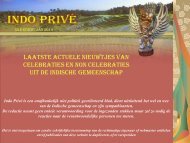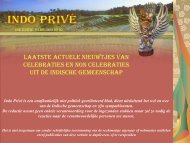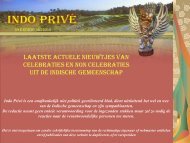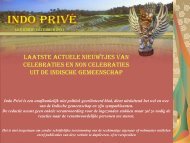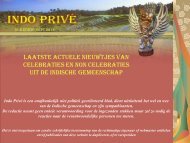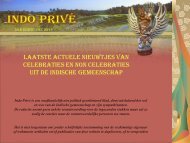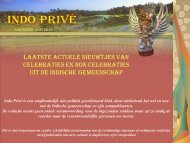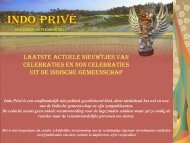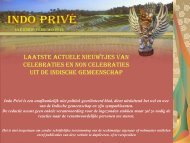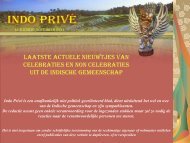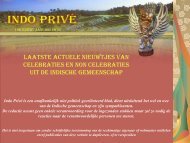Klik hier voor 46e editie april 2012 - Indo Privé
Klik hier voor 46e editie april 2012 - Indo Privé
Klik hier voor 46e editie april 2012 - Indo Privé
You also want an ePaper? Increase the reach of your titles
YUMPU automatically turns print PDFs into web optimized ePapers that Google loves.
Here is my version of an <strong>Indo</strong> and what it means to be an <strong>Indo</strong>. ( for those that have doubts: " a unique human being. " )I often read in the <strong>Indo</strong> about people who say that we should transfer our tradition and the feeling of being an <strong>Indo</strong> to thenext generation. I understand the desire to do so, because I am in the same position.Here follows my explanation why it is impossible to do it.The Jews have their own land, we don't have that.They speak their own language in which their kids grow up, we don't have that.Our kids grow up in a land that does not speak the <strong>Indo</strong> language. They feel being an <strong>Indo</strong> in a different way.The surroundings in which they grow up determines what is of interest to them and where their future takes them.The land of their birth determines that. Whether it be Brazilian, American, Dutch or another nation determines how theyfeel about themselves and how they behave. The influence of their surroundings is undeniable.They speak the language of the land of their birth fluently and without accent. Just like we can speak the <strong>Indo</strong> languagefluently and without accent, because we grew up in that atmosphere.Most often it starts with: " Loh, why are you here? Haven't seen you in a while Bro ( Peh ). "Compare yourself with the Transvaal farmer ( from Dutch origin ), who in spite of their separatists policy namedthemselves South African and are not Dutch. And also speak their own language that does not sound Dutch at all.They have the advantage that they formed their separate community and settled in the land of birth, which we could notdo. Realistically speaking is the <strong>Indo</strong> community a thing of the past with the passing of our generation. And in my viewirreversible. We speak the language of the land where we settled with an accent that we cannot hide.This accent is ours and not transferable to our kids. The feeling of being an <strong>Indo</strong> is also non transferable because ourexperience is unique for our generation.We can transfer the <strong>Indo</strong> hospitality to our kids, but it is impossible to give them the same feeling that we experiencedwhen our parents and grandparents got together at the end of the day to relax and talk about non essentials as a favoritepass time while the sun was setting and they settled down after dinner.That was a time that we refer to subconsciously and with some melancholy as " tempo doeloe " ( old times ).A time in the past with memories that are ours and which made a lasting impression on our generation. A time in which wegrew up and which is not to be repeated anymore nor reconstructed.Thus, in spite of all efforts, I have come to the conclusion that it is impossible to keep the <strong>Indo</strong> culture alive. It isimpossible to turn back the time and to make matters worse we have been short changed by a government of a country towhich we pledged solidarity. What we hear now is: " it has been your choice to emigrate ".Yes, it appears that it was also our choice to enter this world as <strong>Indo</strong>'s.If you differ in opinion, it's o.k.The time will tell who is right.The dying <strong>Indo</strong> community


